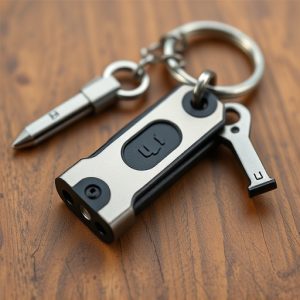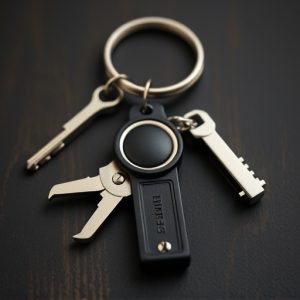Self-Defense Keychain Laws: A Comprehensive Guide by State with Alarm Whistle Features
Understanding self-defense keychain laws by state is crucial for personal safety and legal complianc…….
Understanding self-defense keychain laws by state is crucial for personal safety and legal compliance. These laws vary widely, governing alarm types, carry locations, and usage. Effective keychains should be functional, durable, and feature loud whistles, flashlights, and easy carry clips. States like California have specific restrictions while others, like Texas, allow carrying without a permit. "Stand-your-ground" laws exist in some areas. Responsible use is essential to avoid false alarms or misuse that can lead to legal issues.
“Uncover the power of protection in your pocket with our comprehensive guide to self-defense keychains. In today’s diverse legal landscape, understanding ‘self-defense keychain laws by state’ is paramount for responsible individuals. This article navigates the intricate details, offering a thorough overview of the design, features, and legal considerations surrounding these handy defense tools. From alarm whistles to state-specific regulations, we explore the benefits and potential concerns, empowering you with knowledge to make informed decisions.”
- Understanding Self-Defense Keychain Laws: A Comprehensive Overview
- The Design and Features of an Effective Defense Tool Keychain with Alarm Whistle
- State-by-State Legal Considerations for Carrying Self-Defense Keychains
- Benefits and Potential Concerns of Having a Personal Alarm on Your Keyring
Understanding Self-Defense Keychain Laws: A Comprehensive Overview
Understanding self-defense keychain laws is essential for anyone considering carrying a personal safety device on their keys. These laws vary significantly from state to state, with some permitting the open carry of certain types of keychains while others have stricter regulations. It’s crucial to research and understand these rules before investing in such a tool. Knowledge of Self Defense Keychain Laws by State ensures that you’re compliant and can effectively utilize your defense keychain should the need arise.
Each state has its own set of criteria, including restrictions on the type of alarm or whistle allowed, places where it can be carried, and even the circumstances under which it’s legal to use. Some states allow keychains as a form of self-defense only if they produce a loud noise, while others might have additional requirements like registering your device with local law enforcement. Staying informed about these laws not only helps you stay safe but also avoids any potential legal repercussions.
The Design and Features of an Effective Defense Tool Keychain with Alarm Whistle
The design of an effective defense tool keychain with alarm whistle should prioritize functionality and convenience. This compact device is often crafted with durable materials like metal or high-quality plastic, ensuring it can withstand regular use and potential impact. The keychain typically integrates a loud alarm whistle, which can be easily activated by twisting or pressing a mechanism. This feature serves as a powerful deterrent, drawing attention and potentially scaring off potential attackers.
Keychain alarms often come with additional functions like LED flashlights, providing illumination in dark situations. Some models may also include a pocket clip for easy carry, ensuring the device is always within reach. Understanding local Self Defense Keychain Laws by State is crucial before carrying such a tool, as regulations vary widely. Despite this, many people find it a convenient and legal way to enhance personal safety, especially when traveling or in unfamiliar environments.
State-by-State Legal Considerations for Carrying Self-Defense Keychains
The legal landscape surrounding self-defense keychain alarms varies significantly from state to state in the US. Understanding these laws is crucial before considering carrying such a device for personal safety. Some states have specific regulations regarding the use and carry of personal alarm devices, while others may not have explicit laws addressing them. For instance, California permits the possession of personal alarms with certain restrictions on size and decibel level, while Texas allows individuals to carry self-defense tools like keychains without a permit.
When it comes to Self Defense Keychain Laws by State, it’s essential to be aware that some states have “stand-your-ground” laws, which give individuals the right to use reasonable force, including self-defense tools, if they believe their life is in danger. Conversely, other states may require a specific permit or registration for certain types of personal defense equipment. Therefore, it’s vital to research and understand your state’s regulations before purchasing and carrying a self-defense keychain alarm for added peace of mind and legal compliance.
Benefits and Potential Concerns of Having a Personal Alarm on Your Keyring
Carrying a personal alarm on your keyring offers significant benefits for self-defense, especially in unexpected situations or when alone. This compact device can serve as a powerful deterrent against potential threats, allowing users to protect themselves quickly and discreetly. With just a press of a button, a high-decibel whistle can startle an assailant, attracting attention and giving the user time to escape or call for help. It’s a convenient, hands-free solution that can be easily carried in a pocket or attached to a bag or keyring, ensuring you’re always prepared.
However, there are potential concerns to consider regarding self-defense keychains, particularly legal aspects. Self-defense keychain laws vary by state, and what may be considered legal in one region could be prohibited in another. It’s crucial to understand these regulations before carrying an alarm device for self-protection. Some states might have restrictions on the decibel level or require specific circumstances for its use to be deemed lawful. Additionally, false alarms or misuse of such devices can lead to legal repercussions, so users must handle them responsibly.
In conclusion, a defense tool keychain with an alarm whistle can be a valuable personal safety measure, but understanding local Self-Defense Keychain Laws by state is paramount. This comprehensive guide has explored everything from the design and benefits to legal considerations, ensuring individuals are equipped with knowledge before making their choice. By being aware of your rights and responsibilities, you can maximize the potential of this compact self-defense tool while navigating the complexities of varying state regulations.

